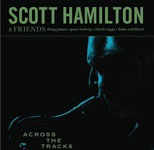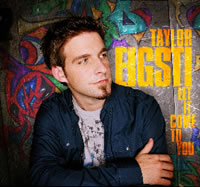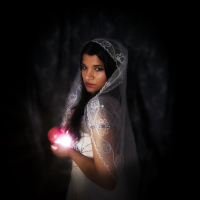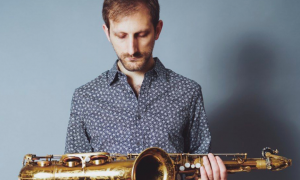Home » Jazz Articles » Interview » Sathima Bea Benjamin: Song Without End
Sathima Bea Benjamin: Song Without End
SBB: He did but that was when we were in Zurich. The next morning when we met him he said "Would you like to come and sing with me in my band?" And Abdullah was sitting right opposite me and then he looked and he said "Oh, oh. Wait a minute." He said "Forget I asked that" because he could see that we were in love with each other. I wanted to say, "Yes Sir. I would." But then on the other hand I was only twenty-three. I had just met Ellington. I trusted him with my whole life, but I didn't know the band. I didn't know these people. I was terrified. I didn't really answer "yes." I wanted to, but at the same time he didn't say to Abdullah, "And you can come along too." He didn't say that.
So when he realized he did say, "Forget I asked that question." And then he did say to Abdullah, "Is she your girlfriend? Do you have intentions for her? Do you realize I just asked her to come away with me; and I really mean that!? If you intend to marry her you should really do this." And a few months later in London Abdullah did. We just got married. He just came and said "Give me your passport" and the next thing I know he came back and he said, "Tomorrow morning we have to be here," and we got married in London. He took Duke's advice seriously.
AAJ: Based out of the Chelsea Hotel... famed as a haven for artists... do you interact with any of its other famous residents during your stay?
SBB: No, just other than to say, "Hi." They kind of know what I do but I don't really know what all of them do. There's a lot of writers and people come and go. There are few, like me, who have been here for thirty years. I can't explain this place. In the next year and a half they are going to turn it into a real hotel. I've spoken with a lawyer who says I have nothing to worry about. They will have to buy me out because I have been here too long. Plus I'm a senior so I will just hang in there and see what happens. But I think it can only be good things happening.
I want to live in New York City because it is the right place to be if you consider yourself a jazz musician. Because you've got to put yourself up against the best of the best. It leaves you open to yourself and that you don't get complacent and start thinking that you're a somebody. It keeps you on your toes with your music, and it keeps you working. Just a vibe... all the creativity. You can just step out of the Chelsea, into the streets and it is almost as if you can catch the creativity in the air in New York City.
Some people say this is not going to last, it's not going to be like this forever. Some people have even said that (I think I read in Time Magazine) in another eighteen years it is going to be Cape Town that's gonna be like that. Well, that will be nice but I might be dead by that time so I can't wait 'til that time. It depends on how long I live.
AAJ: Your "The Liberation Suite" (1982) is a suite divided into three sections which combines Cape Town rhythms with other musical components and a message of peace. Did you find you had to work in a different way when writing an extended piece?
SBB: We were invited to Mozambique (Abdullah, the two kids and I) to celebrate the Mozambique liberation. While we were there, there are a lot of nationalities that live there and they were all integrated and they got their freedom. I sat at that table and I thought, "Oh my God! Look at all these people." And I got the feeling that they also had all these different nationalities within them; and look how they are sitting around here and now they are liberated and free. That was the start of something burgeoning inside of me. On the way home, on the plane, that song came to me: "Nations in me, New Nations are coming." It came from that experience and me just wishing that we in South Africa could go through the same thing.
AAJ: Do you have a preference for writing or performing a song as opposed to a longer suite?
SBB: I don't think I have anything else like the longer suite pieces, since that. But then I say that the "Children of Soweto" kind of goes with it because of the liberation ideas was in it. That's what made me put out that. It was a record I put out called Memories and Dreams (Ekapa, 1983). But no, I don't think about anything... it's very intuitive and very instinctual. In my case since I can't write any music down, I really have to rely on the fact that I get given presents from the angels. I am always open to receiving the presents. And sometimes it is a little frustrating because like, the shortest song I ever wrote, it is called "Color Me Blue;" it goes like this:
Color me blue
African violet blue
The key to my sound
I found
And it rings
It rings—so true
So color me
Color me blue.
Now I have been stuck with these words for like two years now. And I am not getting any melody. I can try to think about it but I know it will come. And it will come when it comes. Obviously I don't know if I am being made to learn patience because I can't get it any other way. I can't sit down at a piano and say, "Oh I am going to write this." I can't do that. If I went to somebody else, I would have to credit them for writing it with me and I actually don't feel like doing that anymore. Because actually they're not really writing it with me, they're just writing it down, transcribing it for me and then they want half of the credit. I just think that because this is so short and so deep, it is so deep. It so expresses, just like the song "Musical Echoes," It is very short but it explains who I am.
AAJ: In your mind, do you make distinctions between your songs and music which contains a message and the ones which does not, a cover of a standard for instance?
SBB: No, because I don't think I have anymore political messages. I don't think there is anymore need for that. In the past I did, I felt the need to incorporate that into my music because it was so much a part of my life but I don't think I have any political messages now.
Now what I am enjoying very much is researching very, very old songs; that nobody is singing any more. And trying to think: How can I present this (to the young ones or the folks who come to hear me)? How can I do it differently without offending the composer? There is a very old song called "Prisoner of Love" I don't even know who sang it; it must have been some vocal group from long, long ago.
I don't even know all the words, I have to go and look for the sheet music. That's nice about New York, you can do research, you know? There's a place called The Colony and if they don't have it, they will get it for you. I have a funny feeling that this song will suit me and I do remember it from so long ago. It has a beautiful melody but I don't know all the words. I have to go to this music place on West 49th [New York] and they will order it for me.
I am doing a lot of old songs. These are songs from like 1945; I do these things because I actually heard these things. I was probably like nine years old and they were being played on BBC radio. I heard a lot of English singers doing them and they had influence on me. They always had very good diction. Do you know of Vera Lynn? Some people say I remind them of her and I am not surprised because this is the stuff I heard on the radio. I think I've got a lot of influences there, English singers, American singers; again I am going to emphasize that I got my sense of diction from Nat King Cole because he you could hear every word that he sang.
World Music
AAJ: In recent years the umbrella termed "world music" has gained a wider visibility to the more casual music listeners. Has this helped your art reach a wider audience?SBB: I think in my case since I am talking about that time, that time slot... it definitely was about world music.
AAJ: Is the world music label itself too confining or esoteric way to describe your art?
SBB: No, I don't have anything against it. I think that's exactly what happened. That I was so directly exposed to world music. Just Cape Town being where it is: world music, world people; just a wonderful cultural mix; a wonderful ethnic and cultural mix of people. I don't know... you know what I do believe? I do believe that the powers that be, the power that is (Angels, God... whatever you want to call it), somehow or other if there is a role in the world that you have to play (and everyone does have a role) then you will get chosen for that. So I think I have been given this. That is very sacred and very divine and if I abuse it this is not going to be good for me. I am very aware of that. You know what? That is all I should have really said to you about everything. I am just very aware of the gift that I have and after all, people think it is just your vocal chords that make you sin but it's not.
When you come to realize this you realize that it is a very lonely place that you are in. In my case it may not be just a little not so lonely because I have Abdullah who is into the music. I have that togetherness with him. Even though we are not together it was the music that brought us together. It was the music that led us to Zurich. It was the music that led us to Duke Ellington. It was Duke Ellington who said that, "You guys don't need to hang out here in Europe anymore; I am going to take you to New York." It is the ongoing line of the music. Now my daughter she does hip hop, my son plays guitar and key board. It's a musical family.
Reflecting Back
AAJ: After a thirty some year wait, if you could go back in time and give yourself as you were then any advice what would it be?SBB: If I had to live my life over again I would leave it just the way it is because I think it has been highly rewarding and a lot of lessons to be learned. All of it is really just a song; the song that is singing within me. This is a song without a beginning and without an end. I don't know where it is going to end. I don't worry about that.
I am constantly thinking about [it]... If it is not my own song; if I am not getting inspiration to write a new song; or if I write the lyrics and the melody doesn't come... it doesn't bother me because I am patient. I think all of us have to learn that lesson of being patient. You can't make something happen... well you can, but then it wouldn't be the real thing. It wouldn't be honest. It wouldn't be truthful. So just learn the patience and just wait. You can ask the powers that be to give you something but you can not demand and you can not command. Not if you're like me. In my case it is also about... some people will go up on a hill to meditate and sit still. I can't sit still. I meditate in motion. That is where I get most inspired. I like to walk the streets of New York and there are always people in the streets. I am walking with in the streets and it is from that that you get your sense of love and you get your sense of direction and you get your inspiration because they are all survivors.
In this day and time, what does it take to survive? Why would you even be so silly as to dare to be a jazz musician? I think a jazz singer... OK you have to be a bit crazy. Then I have to admit that I am but that's OK I think you have to be. My message here is to be true to yourself. It's very difficult to just be true to yourself; if you have been blessed with a voice and sing jazz. I am going to quote my husband, Abdullah Ibrahim: "Jazz is most advanced music on the planet." He didn't say unique but he said advanced. It will challenge the person who says, "I'm into jazz." It will challenge that person to advance themselves; to change their thinking: be in the moment, you have to remember the past, you can never/must never do away with the past (what would I be without my past history?).
Jazz is a forward looking music. It is an all-encompassing music. It gives you the freedom to do that. Whatever... it's just about what are you going to do with that. I am just being as honest and as truthful and I can tell you that it is my joy; my absolute joy in life. If I didn't have this in my live, because there are so many trials and tribulations all the time, I don't know how I would get through the day sometimes. I can be in the kitchen cooking and I can thing of a song. I can do it at anytime, anywhere. I can be thinking about it. I can be thinking about a song.
You know how all these musicians have this "fake" book, and then they go through it and they choose a song. I don't have a fake book. I don't even own one. Whatever I'm singing is because I have heard it before and then it comes to mind again. There's a reason it comes to mind and then you have to sing it! And maybe you have to do something else with it but you have to give it some thought because you have to respect the composer. This is a lot of fun. It is a lot of fun in the end. Ellington said when he brought me here, "You have the greatest gift of all that God can give anybody. That's the gift of imagination; because if you can imagine things, the sky is the limit." You can make all your imaginings a reality.
I don't even see these musicians. I don't socialize with them. They all live their lives, they are all very busy; most of the time they're traveling. I see them the day before if there's a rehearsal (if I can afford it), if not I just see them at the show and I run over the beginnings and the endings. It's all left to chance but I know that they love me and I love them and we love the music. And maybe there are only 30 people in the room (that holds 100) but I know that those thirty people came because they love the music too. It doesn't matter if there's ten people; you still gotta do a performance as if there were a hundred. You owe it to your audience. I always go on and I sing something solo. I just go up and I sing by myself. The guys say, "You don't have to do that you know, Sathima. We know that song." And I say, "Yes, but I need to do that. Because If can not hold this audience in my hands now. If they don't give me their hearts like I am giving them my heart, then I am not going to feel good about bringing you three guys on." By the time I am finished with that solo piece we have set some love going in this club and when I bring them on it is just going to get better. That is just my approach. Everything I do is about love...
And I would have it no other way. I have yet, ever, to make any money out of this music but what I do get out of it is so precious, I have no words. It's a giving thing. I am being given and then I am giving away. If you don't give it away and it goes around in a circle... everything goes around in a circle. I don't know why people talk about squares... I don't know I think everything is a circle. Even the Earth is round; the moon is round; the sun is round. Everything is about a circle... I don't know where the square came in; that's a man made thing. It's all about going around in a circle.
You start at one point and you go all around to the end point, where you end at the point you began. Then maybe you breathe a sigh and then you go on again. You just keep repeating that circle. All you need honey is courage to take the leap. Personally I think doing jazz singing is like jumping off a cliff. You don't even know where you are going to land, you just jump off the cliff. You really have to take that risk. You have to take a leap of faith... The music is a gift. It is divine. I hope and I pray that I never misuse or abuse it in any way. It's something that just takes me out of myself every day, just thinking about it... getting inspiration to write a new piece or getting inspiration to complete a piece or taking something from yesterday and making it new while having respect for the composer. And who knows, because I am sure like Victor Herbert, because there is another place that we go... Duke Ellington, my Mom, my Dad... they are all hanging out you know. Victor Herbert, when he hears me do "Sweet Mystery of Life" maybe he's happy about it because his song is coming back after 106 years, even though I am swinging it (I am not doing it as he wrote it—light operetta).
I am bringing the music back. I bring old songs back, I love doing that. But I wouldn't do it if it was coming from a fake book. I wouldn't do it unless it came from my heart. I wouldn't. Everything I do is heartfelt and done from there. That's how I live. It's a dangerous way to live because there are no assurances. I think it frustrates my husband because he'll say "Why? It would be better... Why don't you come back and live in Cape Town? Why do you have to be in New York?" I don't have an answer. I cannot tell you why I haven't moved yet. I know I want to live here but I don't want to die here. You know we are all going to die but people will say, "Oh why are you saying that?" Why are Americans so afraid to talk about death? Like you're not going to die? I am concerned with the fact that as a musician I have a legacy. That is why I am so careful about that I do and how I do it. That is what you ultimately leave behind. Some of the people who don't know about me know, or don't want to know about me know, or just totally ignore me completely; they will eventually one day say, "She was here and we didn't know that." That happens. That happens with great and grand people like Thelonious [Monk].
I am not saying I am great, I am not saying I am daring. Oh no, I think I am daring... I would dare to do what others would choose not to. But someone like Thelonious Monk, I utterly adore Thelonious Monk... I don't listen to other singers, I did when I was young but I don't listen to other singers for fear that I might take in something that I don't need to take in. I have plenty that I didn't even attack yet. I don't have enough time to express it all so I don't really listen to singers for feat that I might take in something that they are doing. I think I need to learn from other things. I do like listening to Rollins, I love Rollins. I love Thelonious Monk. I love Coltrane. My favorite piece is "Dear Lord." If ever I want to just lie down on the floor, close my eyes. I will put that CD in and I put it on and I listen to "Dear Lord." I find that piece so inspiring. It is just awesome. It just makes my cells tingle.
There is another piece called "All Alone." Monk plays it solo, he plays it just solo piano. It is so... then I figured out Monk I think he must have listened to the lyrics to play the song. He is playing it with the lyrics... I wanted to sing that song but I am not going to sing it because Monk is the ultimate version of "All Alone."
The music has never let me down. I think I might have let it down sometimes, but the music has never let me down. What I get out of this is I get love back.
Tags
PREVIOUS / NEXT
Support All About Jazz
 All About Jazz has been a pillar of jazz since 1995, championing it as an art form and, more importantly, supporting the musicians who make it. Our enduring commitment has made "AAJ" one of the most culturally important websites of its kind, read by hundreds of thousands of fans, musicians and industry figures every month.
All About Jazz has been a pillar of jazz since 1995, championing it as an art form and, more importantly, supporting the musicians who make it. Our enduring commitment has made "AAJ" one of the most culturally important websites of its kind, read by hundreds of thousands of fans, musicians and industry figures every month.





















